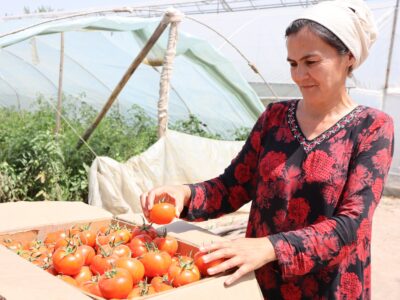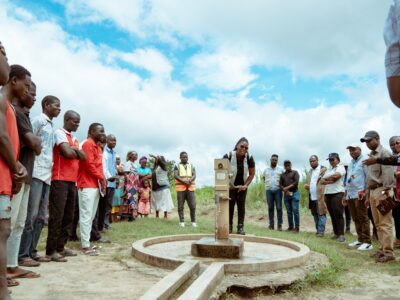FOUR ACDI/VOCA STAFF PRESENT CLA APPROACHES AT LEARNING EVENT
Case studies from USAID/Bangladesh and ACDI/VOCA’s AflaSTOP project in Kenya were two of five winners selected by USAID from more 60 entries in its recent CLA Case Competition. The case studies highlight how projects put collaborating, learning, and adapting (CLA) into action. Case study winners presented their work Tuesday at the USAID Learning Event in Washington, D.C., entitled “Moving the Needle 2015: Better Development Programming through Collaborating, Learning, and Adapting.”
ACDI/VOCA’s Sophie Walker (AflaSTOP), Ann Garloch (AflaSTOP), Kavita Chambery (Bangladesh), and Hayden Aaronson (Bangladesh) led breakout sessions at the event to explore in more detail the practical elements of their respective cases. They were honored at the awards ceremony by Stacey Young, Senior Learning Advisor, USADI/PPL/LER, and Piers Bocock, Chief of Party of USAID LEARN. Over 130 participants from USAID and the implementing partner community engaged in this interactive conference.
In Kenya, CLA Approach Enables More Sustainable Technology Design and Adoption
ACDI/VOCA’s AflaSTOP COP Sophie Walker and Director, Inclusive Market Systems, Anna Garloch presented their case study “Embracing CLA to Drive Technology Adoption in Kenya: AflaSTOP’s Experience.” Co-funded by USAID and the Bill & Melinda Gates Foundation and jointly implemented by ACDI/VOCA and Agribusiness Systems International (ASI) under the direction of the Meridian Institute, AflaSTOP is identifying promising storage options to fight aflatoxin in Kenya while designing viable drying technologies to dry maize to safe storage levels. The case study focuses on AflaSTOP’s drying component in particular and how a CLA approach is helping implementers overcome challenges and sustainably achieve development objectives.
To achieve its vision, AflaSTOP must successfully design a new technology, transfer it to the commercial sector, and facilitate going-to market and scale up – all within a few years and with very limited market-distorting subsidies. This case explores lessons learned around work planning; pilots and user testing with the private sector to enable learning and responsive adaptation, budgeting, sub-management; and the important links between communication and collaboration.
In Bangladesh, CLA Approach Promotes Collaboration to Improve Productivity of Livestock Sector
USAID/Bangladesh’s winning case study, “Collaborating, Learning and Adapting to Develop the Bangladesh Dairy Sector,” focuses on the coordination and collaboration of seven livestock projects funded by seven different donors. The Feed the Future Bangladesh Livestock Production for Improved Nutrition program, implemented by ACDI/VOCA, is a member of the Bangladesh Livestock Coordination Group.
ACDI/VOCA’s Kavita Chambery, Director of Resilience and Growth, and Hayden Aaronson, Director, Market Systems, presented the winning case. The group aims to improve the productivity of the more than 35 million cattle in the Feed the Future Zone of Influence in southwestern Bangladesh, about one fifth of the country’s cattle, through greater coordination, standardization of technical trainings, field exchange visits, joint training sessions, and tactful collaboration.






